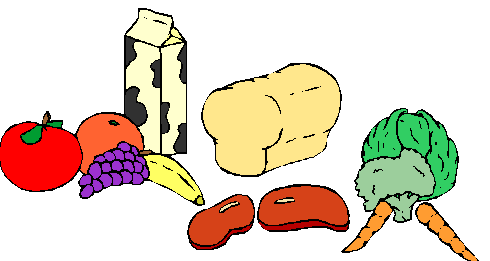The
Foundation of The Body - Nutrition 101
 So
often people come to me asking advanced questions looking
for some wondrous new supplement to magically transform their
bodies. They often know words such as "microfiltration."
They ask about whey protein isolates and glutamine peptides.
They're trying to figure out how to get the results they seek
by employing some new nutritional technologies. Here's
what they fail to recognize. The secret to obtaining
a result through any nutrition program lies in the basic fundamentals.
Forget all that advanced information right now. We'll
get to it. For now, I want you to understand that the
body survives and thrives by ingesting and making optimal
use of nutrients. So
often people come to me asking advanced questions looking
for some wondrous new supplement to magically transform their
bodies. They often know words such as "microfiltration."
They ask about whey protein isolates and glutamine peptides.
They're trying to figure out how to get the results they seek
by employing some new nutritional technologies. Here's
what they fail to recognize. The secret to obtaining
a result through any nutrition program lies in the basic fundamentals.
Forget all that advanced information right now. We'll
get to it. For now, I want you to understand that the
body survives and thrives by ingesting and making optimal
use of nutrients.
The
Nutrients
 There
are six categories of nutrients. A nutrient, by definition,
means "something you need to ingest to sustain life."
Read that again. It doesn't say "something that's
an option if you want to build muscle." It doesn't
say, "something you need to avoid if you want to lose
fat." It says, "something you NEED to SUSTAIN
LIFE!" If you can remember that simple definition,
you'd immediately see the flaw in any diet that asks you to
avoid any of the nutrients. It's also important to recognize
that the nutrients all interact, and while they have their
specific roles, if any vital nutrient is absent or in short
supply, some bodily system is going to suffer. The nutrients
are: There
are six categories of nutrients. A nutrient, by definition,
means "something you need to ingest to sustain life."
Read that again. It doesn't say "something that's
an option if you want to build muscle." It doesn't
say, "something you need to avoid if you want to lose
fat." It says, "something you NEED to SUSTAIN
LIFE!" If you can remember that simple definition,
you'd immediately see the flaw in any diet that asks you to
avoid any of the nutrients. It's also important to recognize
that the nutrients all interact, and while they have their
specific roles, if any vital nutrient is absent or in short
supply, some bodily system is going to suffer. The nutrients
are:
 |
Proteins |
 |
Carbohydrates |
 |
Fats |
 |
Vitamins |
 |
Minerals |
 |
Water |
Protein
is the material from which we build new healthy
cells. If you are going to maintain a healthy body,
if you are going to be able to perform at your best, if you
are going to remain efficient at burning fat, you must make
certain you take in sufficient protein. Proteins are
made up of 22 amino acids. The amino acids are broken
down in the digestive tract, absorbed in little chains of
two and three (called di- and tri-peptides), and then rebuilt
as cells. This process is called protein synthesis.
It is the process that inherently "builds" muscle.
That doesn't mean eating "more" protein will result
in more muscle. You are going to have to utilize some
trial and error, keeping an eye on your body composition,
to determine how much is best. If you take in more protein
than your body is going to use for protein synthesis, you
run the risk of accumulating additional fat.
Carbohydrates
are your body's preferred source of energy. While simple
sugars and refined carbs are easily converted into triglycerides
with the potential to be stored as bodyfat, a combination
of slow-release starches and vitamin and mineral dense fibrous
carbs provides an efficient source of energy and fuel storage.
Consuming meals complete in protein and carbs frequently throughout
the day offers a time tested plan for a healthy metabolism
and consistently high energy levels.
Fats
may be the most misunderstood of the nutrients. Over
the past ten or twenty years, we've heard repeatedly that
fats are bad. The fact is, if you take in more fat than
your body needs, or you take in unsupportive fats, you are
likely to accumulate bodyfat. There is also a very high
correlation between excessive fat intake and high levels of
cholesterol leading to coronary artery disease. That
doesn't mean that fat is bad. We NEED fat. Remember,
it's a nutrient. Not only does fat cushion, pad, and
protect our internal organs, but it plays a role in brain
function, sexual performance, and cell metabolism. The
"good" fats would come from unsaturated sources
which would include most oils. The fats to avoid would
be saturated fats, such as the fats found in dairy products
and meats, and hydrogenated fats which are treated in a laboratory
or factory until their biological human value is virtually
destroyed.
Vitamins
are the little catalysts that allow all of the bodily functions
to take place. While specific vitamins have their given
roles, they all interplay. Obtaining your vitamins from
food is going to require natural food choices. You'll
find your best selections by shopping in Natural Markets or
by making most of your choices from the perimeter of the supermarket
where you'll find fresh produce. Vitamins DO NOT provide
energy! Yes, they play a role in energy production,
but there isn't a single vitamin or vitamin formula that will
give you energy. Energy is the efficient utilization
of calories. Proteins, carbs, and fats all have calories.
Vitamins, minerals, and water do not. There is substantial
evidence to prove the validity of the protective properties
of anti-oxidants. These include Vitamins A, C, and E.
While vitamin supplementation will not provide energy, an
antioxidant supplement might be a worthwhile investment as
insurance to protect your health.
Minerals
are
absorbed from food and combine to form bodily structures,
enzymes, or hormones. Just as vitamins, minerals are
void of calories and can not provide energy. Each mineral
has its own role, and like vitamins, the micronutrients all
interplay to all the body to perform at its best. There
isn't any single mineral that works alone. Many people
take calcium in the hopes they'll resist osteoporosis.
If calcium is taken alone, much of it is wasted. You
also need flouride, zinc, magnesium, and a host of other minerals
to build bone. A multi-mineral formulation is also a
worthwhile supplement for exercising individuals seeking optimal
health and fitness.
Water
is the most abundant and perhaps the most life sustaining
nutrient. Your brain and muscles are more than 75% water.
Water comprises more than 80% of your blood. The quality
of your cells and tissues rely heavily on the amount of pure
water you consume. There are formulas you can use to
estimate the amount of water that would be optimal, but to
keep things simple, the old "eight glasses a day"
is a pretty good rule.
The
Thermic Effect of Food
It's also important
to understand that the body is going to burn calories any
time work is required. That would include digestion
and assimilation of nutrients. Since metabolism can
be defined as the speed with which your body burns through
food, you don't want to avoid calories, but rather use them
efficiently. Supportive meals are far more "thermic"
than high fat meals, which is why Supportive Eating by itself
will have a positive impact upon metabolism.
There isn't any
way around it. If you want to be fit, healthy, happy,
and lean, you have to eat!
Now, with a foundation
of basic nutrition, you should understand that getting results
has far less to do with supplements than it does with nutrients,
and nutrients come from FOOD! Learn to eat supportively.
There are then some supplements that can act as aids, and
others that can cause some serious harm. Use the links
below to find details on some of the nutritional supplements
you might have wondered about. Be sure to visit the
Fitness Superstore to
explore the products available on-line.
Suggested
Next Page:
Get Started
Reading About Any of the Supplements That Have You Intrigued
or Confused:
Supplements
If
You Haven't Been There Yet:
Click
on [ Fitness Superstore
] to get any of Phil's Proven products.
Click
on the [ MENU ] to explore other topics
and fitness truths.
Other
Pages to Explore:
[
TRANSFORM ] [ ANSWER
]
[
Feedback ]
 e-mail
Phil Kaplan e-mail
Phil Kaplan
site
designed and operated by
Phil Kaplan
Phil Kaplan's Fitness Associates
1304 SW 160th Ave., #337
Fort Lauderdale, Florida 33326
(305) 824-5044 (954) 389-0280
Fax (954) 742-3173
|

